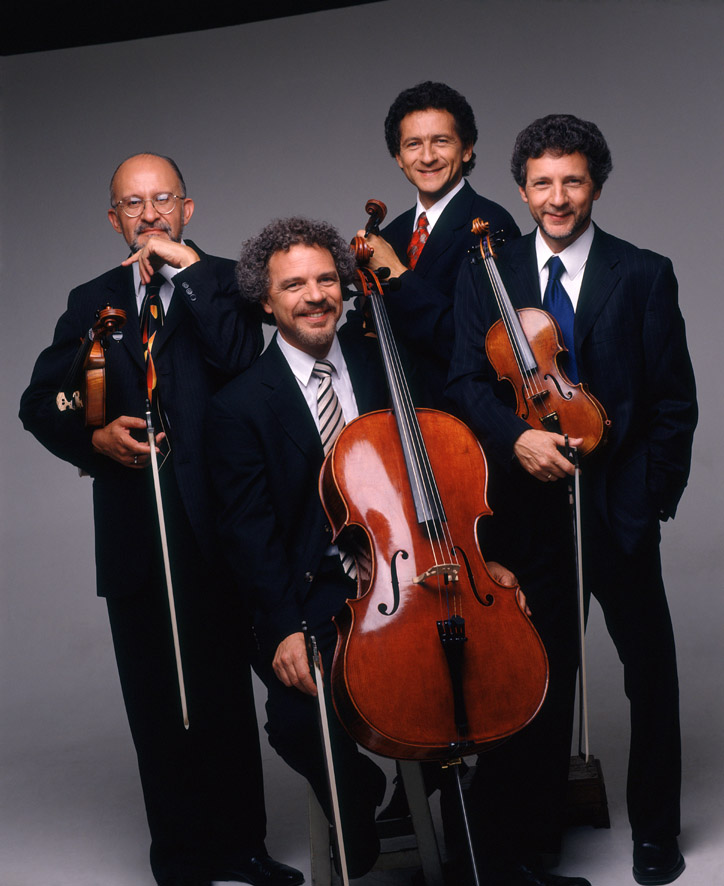Cuarteto Latinoamericano serves up a wealth of music from south of the border
Save for the occasional showpiece or Piazzolla item, music by Mexican and South American composers has been given short shrift on concert programs in the United States. The Cuarteto Latinoamericano has been filling that lacuna over the past few decades by bringing much-deserved attention to such music through thoughtful concert programs and award-winning recordings.
Sunday afternoon at Rockport’s Shalin Liu Performance Center, the celebrated quartet offered stirring performances of works by Mignone, Villa-Lobos, Ginastera, Ponce, and Piazzolla, just a few of the composers whose music has come to define the ensemble’s unique style.
The quartet—brothers Saúl Bitrán (violin), Arón Bitrán (violin), and Álvaro Bitrán (cello), along with Javier Montiel (viola)—play together with a clean ensemble blend and a tone that is occasionally warm but thoroughly penetrating in both soft and aggressive passages.
Those aspects were on display in their performance of Alberto Ginastera’s String Quartet No. 2. The five movements of this work contain episodes of harsh Bartókian dissonance, forceful driving rhythms, and dreamy sequences that call for the players to perform a number of extended techniques, from pizzicato slides to tapping the wood of their instruments.
The third movement was the most colorful, with the quartet mining the lyricism and humor from the music’s sparse textures. The fourth revolved in solos for violin, viola, and cello, and Montiel and the brothers Bitrán deftly traded their phrases with shimmering tone.
The quartet also played with a fine ear to the work’s architecture, taking care to build thick blocks of sound from the sparse, ghostly sonorities that introduce the second movement.
But it was the work’s dance rhythms and driving energy that showcased the musicians at their best. They played the lightning lines that permeate the outer movements of Ginastera’s score with explosive intensity.
Dance music is just one of the characteristics that gives Villa-Lobos’ String Quartet No. 5, also heard Sunday, its popular appeal.
There’s much to like in this piece: the choros-style lyricism, the gentle swing of compound rhythms, the schmaltzy harmonies, whistling violin harmonics that recall a village flute band, and almost schizophrenic shifts in mood and character.
The Cuarteto Latinoamericano musicians played it all with palpable energy. They dug in for the driving rhythms of the final movement. The lyrical phrases of the first were given sensitive treatment, while the second featured the musicians in a wash of orchestral effects, from rumbling bass lines to ear-tingling harmonics.
Similar to Villa-Lobos’ style, the music of Francisco Mignone combines hints of Puccini-like lyricism with folk traditions and dance rhythms of the composer’s native Brazil. Those elements are apparent in his Second String Quartet, a work cast in an attractive and improvisatory style.
Cuarteto Latinoamericano handily traversed the music’s frequent shifts in mood. Long flowing melodies dissolved into short statements while some passages were underscored by chugging rhythms.
Here too, a driving Bartókian intensity characterized the outer movements, where sudden bursts of dissonance and across-the-fingerboard strums punctuated lines of ballad-like sentimentalism. The musicians of Cuarteto Latinoamericano played it with the verve of a folk band.
Yet the work’s lyrical moments proved more difficult for the musicians to pull off. The solo line that stretched into the upper register of Álvaro Bitrán’s cello didn’t always sing, and the ensemble lost some of its polish as chords and octaves wandered in and out of tune.
That was remedied in the quartet’s beautiful performances of two short pieces by Manuel Ponce.
The composer’s Estrellita, one of a pair of songs published in 1914, has had many lives through multiple translations, instrumentations, and performances by the likes of Luciano Pavarotti, Jascha Heifetz, and Beverly Sills.
Álvaro Bitrán’s arrangement for Cuarteto Latinoamericano captured the inviting warmth of the original, with violinists Saúl and Arón Bitrán trading sunlit lines. Montiel and Álvaro Bitrán supplied sensitive support.
Ponce’s charming Gavota was scored for string quartet by Mexican violinist and conductor César Quirarte Ruiz from the original piano solo. The short work featured the quartet in both lyrical and playful episodes, with the musicians shaping the lines with graceful and ebb and flow to the tempo.
Rounding out the program was Astor Piazzolla’s popular Four, for Tango.Originally written for the Kronos Quartet, this fiery work brims with swirling energy. The musicians of Cuarteto Latinamericano, in some of their most colorful playing of the afternoon, offered a sturdy performance, playing the work’s grinding dance rhythms and bristly, percussion-like sonorities with rapt attention.
A single encore, Carlos Gardel’s warm and lyrical Volver, put the finishing touches on a rewarding afternoon.
The next event of the Rockport Chamber Music Festival will feature cellist Cicely Parnas and pianist Noreen Polera in music by Beethoven, Brahms, Messiaen, and Peter John 7:30 p.m. July 7 at the Shalin Liu Performance Center. rockportmusic.org.
Posted in Performances






Posted Jun 29, 2015 at 10:29 pm by Laura Montiel
Very proud to be mexican, very proud of having this kid of great musicans in Mexico, great rewieu.